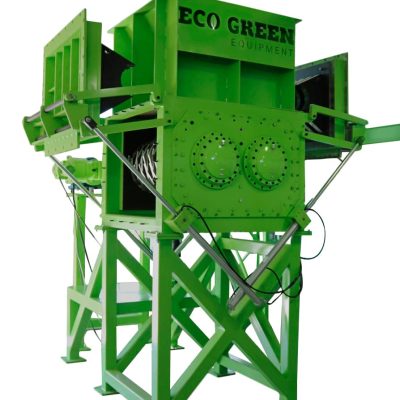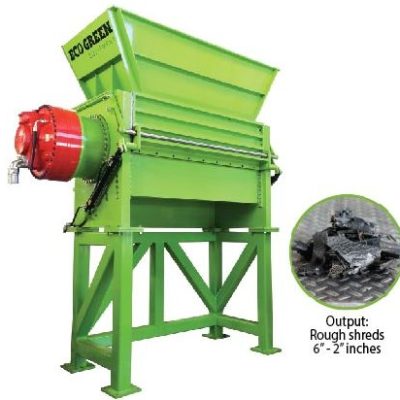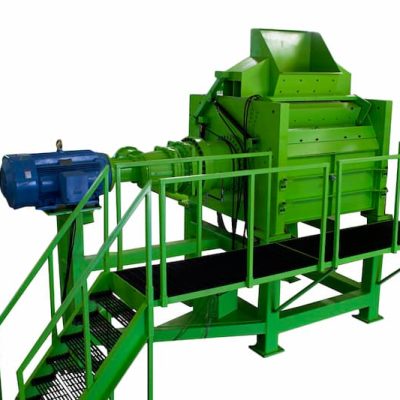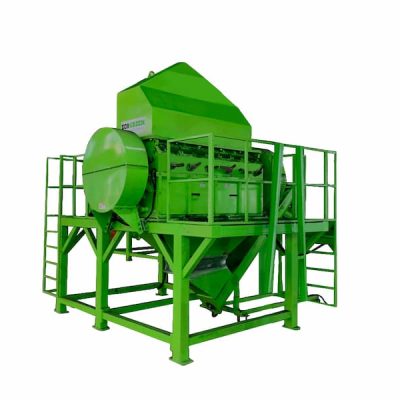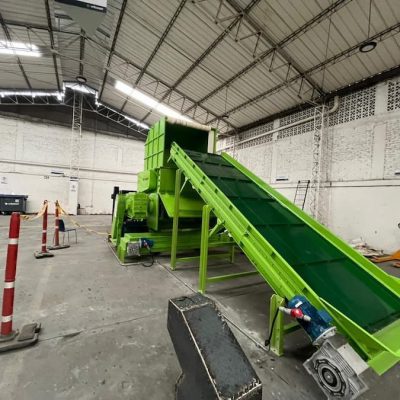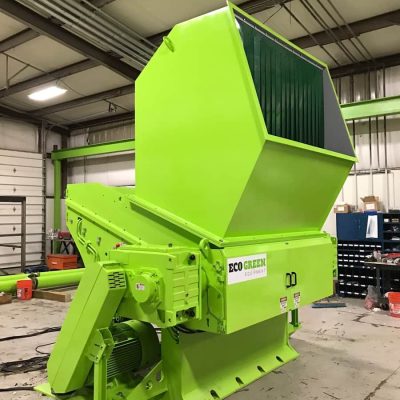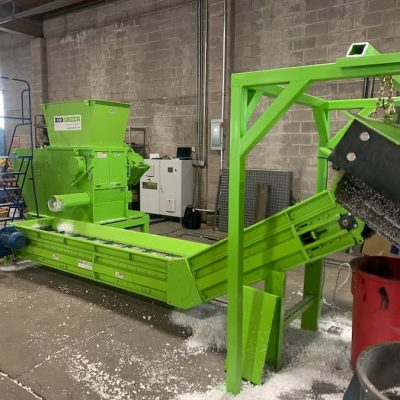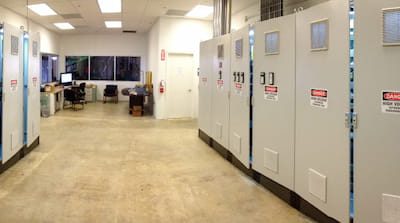Textile
Recycling Equipment
When trying to reduce carbon emissions and slow climate change, the focus often falls on a few key industries that contribute significantly to waste production and greenhouse gas emissions. However, pointing a finger at a single source misses the scope of the problem. At ECO Green, we know the solution is much more complicated than it may appear on the surface. Our global predicament is not the result of one process, wasteful habit, or type of waste. It is a combination of factors that touch every aspect of our lives. Making notable strides in cleaning up our planet and reducing waste requires a broader approach.
For nearly two and a half decades, ECO Green Equipment has worked with recycling companies worldwide to reduce the waste tire rubber in landfills. We pride ourselves on designing equipment that is durable, easily maintainable, energy-efficient, and ready to install alongside existing equipment in recycling lines. The same equipment that waste tire recyclers are using to make great strides in creating new and useful products from end-of-life tires can also be useful in recycling waste from many other industries.
Why Recycling Textiles Is Essential
Consider the following two facts released by the European Parliament:
- The textile industry is one of the top polluting industries.
- Textiles are one of the fastest-growing industries.
Textiles are a hidden danger to our planet. While a cotton t-shirt may seem harmless enough, producing enough cotton tees to clothe the world presents a problem for the planet. Every step of the process, from growing and harvesting the cotton to cutting out and sewing the shirt to disposing of the threadbare top in a couple of years, requires resources or creates waste.
Additionally, as textiles decompose, they emit greenhouse gases and leach chemicals, such as fabric dyes, into the soil. Recycling these old textiles into new products is a critical move towards greener living and a healthier planet. ECO Green is dedicated to supporting this effort by providing top-quality textile recycling machines.
Starting a Textile Recycling Business
Every successful recycling business needs three essential components.
- A source for raw materials to recycle
- Excellent textile recycling equipment that maximizes output while minimizing downtime
- Customers willing to buy their end product for a profit
Raw Materials
The raw material for textile recycling is abundant. Some possible sources include worn-out clothing, scrap material from an apparel manufacturer, and used commercial fabrics. With few current recycling options, they often end up in landfills or incinerators. Neither is an ideal option, as the material is not reused and contributes to greenhouse gas emissions. Recycling businesses that culture relationships with top textile waste producers can leverage this healthy supply of used and scrap fabric for recycling.
ECO Green Recycling Equipment
As countries around the world struggle to pass and implement new rules to encourage sustainable textile manufacturing, reuse, and recycling, ECO Green is stepping up to help recyclers be a part of the solution. We recognize the importance of reducing textile waste, as well as the great need for textile recycling facilities around the world. Our proven recycling equipment is ready to help entrepreneurs tackle the world’s growing textile waste problem.
The first step in the process is to sort fabrics by type and by color. Processing like colors and fabric types reduces the amount of processing fibers must undergo and preserves their integrity.
Once sorted, textile recycling is largely a mechanical process. Fabric shredders shred textiles and pull apart fibers. Maintaining the strength of the fibers is essential to making new products from the old. These fibers can then be spun together to form threads or yarns used to create new fabrics. Some fibers are, by nature, more fragile than others. These fibers may be woven with new or stronger fibers to produce more durable and higher-quality fabrics and threads.
The same process and textile recycling equipment that turns old clothes into fabric for new clothes can also recycle plastics into threads. For example, shredding plastic water bottles yields small plastic pellets. After passing through a plastic extruder, these granules come out as plastic strands. These plastic fibers can be spun together to form material to make sturdy grocery bags or other reusable products.
Sales
The condition and composition of raw recycling materials significantly impact the recyclability of textiles and the end products they can become. However, recycled fibers made from materials such as cotton, polyester, and wool are excellent resources for manufacturing new textiles. Manufacturers may use them in jeans, towels, blankets, coats, sportswear, or even carpets.
The Future of Textile Recycling
As regulations place pressure on textile and clothing manufacturers to create more sustainable fabrics, the demand for sustainable fabrics and recycling services may also grow. In 2022, the value of the textile recycling market stood at 6.9 billion. By 2027, projections place its value rising to 9.4 billion. Change appears to be on the horizon, and ECO Green is equipped to help recyclers navigate the unique challenges of thriving in this burgeoning industry. Our experienced team of recycling experts can help you select the best equipment for your textile recycling needs, from clothing shredders to conveying and baling equipment.
ECO Green Values
ECO Green Equipment has dedicated itself to improving recycling equipment for over two decades to increase run time, efficiency, and durability. We know your recycling business needs equipment that works just as hard as you do to produce a superior recycled product. An investment in ECO Green textile recycling equipment is an investment in your future and the future of our planet. Our team proudly stands behind our equipment and beside our clients. From selecting the right equipment to maintaining and upgrading it to meet the changing needs of their business, we are committed to providing excellent customer service regardless of your location.
If you are interested in learning what it will take to join the growing number of textile recyclers and take advantage of the ever increasing market for textile recycling, contact our team of recycling specialists. They can assist you in selecting the best equipment for the job.

